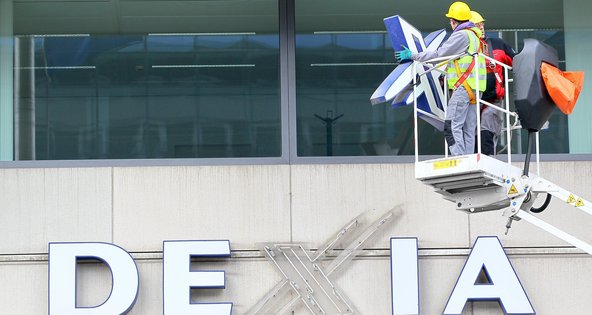 Julien Warnand/European Pressphoto AgencyWorkers removed the logo from the Dexia’s headquarters in Brussels in February after the Belgian part of the bank was nationalized.
Julien Warnand/European Pressphoto AgencyWorkers removed the logo from the Dexia’s headquarters in Brussels in February after the Belgian part of the bank was nationalized.
9:49 a.m. | Updated
PARIS — The French and Belgian governments said on Thursday that they would inject an additional 5.5 billion euros into Dexia, a bank that has been troubled since the 2008 financial crisis, in an acknowledgment that it finances have continued to deteriorate.
The two governments will obtain preference shares in exchange for the new capital, equivalent to about $7 billion, giving them first rights to any value the group might eventually yield.
Belgium will provide 2.9 billion euros, 53 percent of the new funds. The French government will provide the rest, about 2.6 billion euros. They have also renegotiated their credit guarantees to Dexia, whose operations were concentrated largely between Belgium and France at the time of the credit crisis.
They said the new capital was necessary because “a certain number of hypotheses underlying the plan” for the bank’s orderly resolution had been revised. In particular, assumptions about the bank’s financing costs had turned out to be too optimistic. Its Dexia Municipal Agency unit will now have its value effectively wiped out in a planned sale to the French government.
Dexia S.A., the group holding company, has a negative net worth after writing down the full value of its stake in Dexia Crédit Local, it said. The holding company also reported a third-quarter loss of 1.2 billion euros, and a loss of 2.4 billion euros for the first nine months of the year.
France, Belgium and Luxembourg, where the group has an operating subsidiary, are winding down Dexia after the bank reached the verge of collapse in the September 2008. The bank foundered after the collapsing credit bubble exposed its reliance on short-term financing, and its balance sheet was scorched by failed investments that included hundreds of millions of dollars in unsecured Lehman Brothers bonds.
Paris and Brussels agreed in 2008 to shore Dexia up with more than 6 billion euros. In October 2011, they decided to nationalize the bank after worries about its exposure to Greek debt led to a run on its shares, not long after the European Banking Authority had given it a clean bill of health after a stress test.
Dexia’s government-appointed administrator, Karel De Boeck, said at a news conference in Brussels on Thursday that the recapitalization was necessary because Dexia had a deficit of 2.2 billion euros in its finances, Belgium’s RTL broadcaster reported.
Without the agreement, “we would have had a hearse waiting outside the door,” RTL cited him as saying, adding: “A total and immediate liquidation of Dexia – for which there are various obligations stretching out to 2099 – would cost a ridiculous amount of money.”
Dexia continues to hemorrhage money, even as it dumps assets. It booked a loss of 599 million euros on the sale of its Turkish unit, DenizBank. It also booked a loss of 466 million euros on the sale of Dexia Municipal Agency, which it is selling to the French government for 1 euro, rather than the 380 million euros it had assumed previously.
France and Belgium, both struggling to bring their finances into line with European Union standards at a time of economic stagnation, can ill afford an open-ended commitment to Dexia.
The governments said on Thursday that they had agreed to reduce loan guarantees made to Dexia Group in 2011, to 85 billion euros from 90 billion euros. In line with the new capital injection, Belgium’s share of the guarantee falls to 51.41 percent from 60.5 percent, while that of France rises to 45.59 percent from 36.5 percent. Luxembourg’s is unchanged at 3 percent.
They must also go back to the European Commission, which adjudicates antitrust matters, and seek approval for the latest bailout.
Article source: http://dealbook.nytimes.com/2012/11/08/dexia-gets-new-5-5-billion-bailout/?partner=rss&emc=rss
Speak Your Mind
You must be logged in to post a comment.